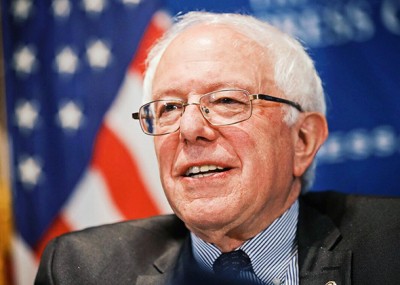Why the American Ruling Class Fears Bernie Sanders
He's an old-fashioned reform minded, capitalist social democrat who thinks capitalism can be reformed and that the Democratic party can be reformed.

The American ruling class clearly fears that Bernie Sanders might become president of the U.S.. Due to his massive victory in the Democratic primary vote in the state of Nevada, and his ever-growing support across the U.S., the American intelligence agencies, establishment political figures, and corporate media have launched a concerted campaign aimed at destroying his campaign for the U.S. presidency.
Based on lies, and no facts, they absurdly contend that Bernie Sanders is somehow associated with or supported inside the U.S. by the Russian government. Typical is a front-page New York Times article under the headline ‘Seeking Chaos, Moscow Places Its Bets in U.S.,’ Nothing in the article backs up this headline other than a series of statements attributed to unidentified ‘intelligence sources’ and others suggesting that ‘somehow’ Moscow supports Sanders.
In reality the American ruling class, including the Democratic and Republican party establishments, and their media accomplices, fear of Sanders has nothing to do with Russia. They fear him because his campaign is based on a direct appeal to the interests of American workers, the vast majority of the American people, and is opposed to their interests.
First, they fear that as president Sanders would actually try to enact his capitalist reformist program, which would – to a very limited degree – cut across their interests and power. That program includes legislation to curtail the power of Wall Street and finance capital; reduce the power and wealth of the gigantic pharmaceutical and health industry through universal government medical insurance; and somewhat reduce the power of the military-intelligence system by reducing military expenditures and ending middle east wars.
Second, they fear him because they fear the American working class and he does not fear it; he considers it his political base. His entire campaign and politics is based not on identity politics predicated on which religions, ethnicity, gender, or race people belong to; it is based on the opposite premise of uniting the vast majority of Americans based on their common identity as workers their common interests as members of the working class.
Third, they fear him because as president it would be within the scope of his politics, or those of his supporters, to mobilize extra-congressional working class mass support for his limited program including mass demonstrations like a ‘march for social equality’ or a ‘march for universal health care’ or a ‘march against war’ in Washington.
This in turn might unleash social forces far beyond anything Sanders might intend, as his mission is to secure limited social reforms within capitalism.
To be clear, Sanders is not a socialist despite labeling himself as one. He supports both the American capitalist state and its capitalist economy. He talks of the ‘billionaire class’ but favors only legislation which would reign it in to a limited degree but leave it, and finance capital intact. Moreover, his past support for the war-monger and anti-working class campaign for president of Hillary Clinton, and his campaign for president through the democratic party are real stoppers.
But Sanders is not the charlatan as portrayed sometimes by socialists or others; he’s an old-fashioned reform minded, capitalist social democrat who thinks capitalism can be reformed and that the Democratic party can be reformed. If he becomes the U.S. president, his limited program, which in no way threatens the fundamental interests of the capitalist class, will nevertheless face formidable obstacles, including the democratic party itself, the military-intelligence apparatus, and a congress stuffed with millionaires who represent not the working class but finance capital and big business.
To deal with these obstacles, a president Sanders will face two stark choices. He will need to either retreat step-by-step from his left-reformist program, or he will need to push through these obstacles through mass extra-congressional social mobilization by him or his supporters, potentially including mass marches on Washington, mass meetings across the country, and novel uses of the internet such as a ‘vote for progress’ website inviting all workers to register their approval for the Sanders programs which would directly benefit them.
To be clear, Sanders role model is not real socialists or real socialism, past or present butt Franklin Roosevelt and Roosevelt’s 1930’s capitalist ‘New Deal’, which introduced the social security old age pension, legislation to make union organizing easier, and large-scale government employment to build U.S. infrastructure. Sanders rhetoric rise and his programs and politics are derived to a large degree from Roosevelt’s. It’s highly instructive to listen to Roosevelt’s First Inaugural speech to see where Sanders is coming from: see this.
*
Note to readers: please click the share buttons above or below. Forward this article to your email lists. Crosspost on your blog site, internet forums. etc.

